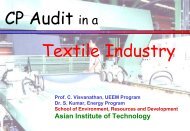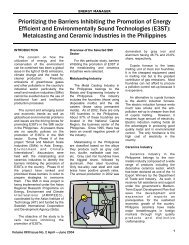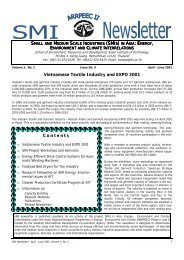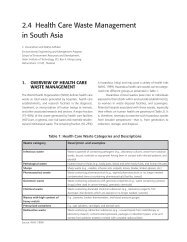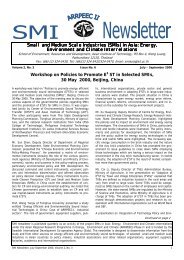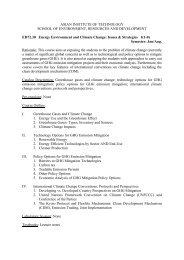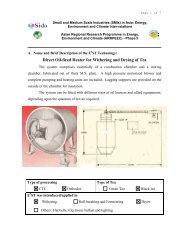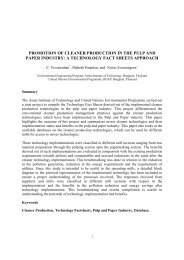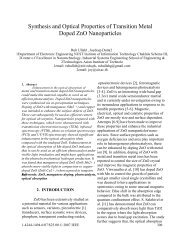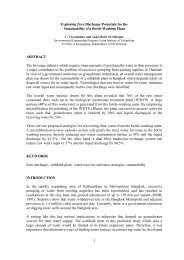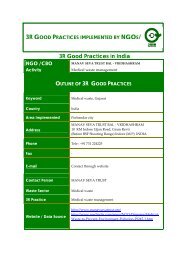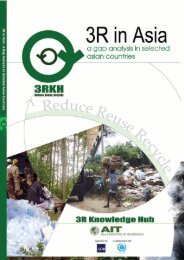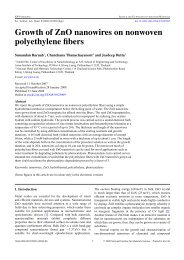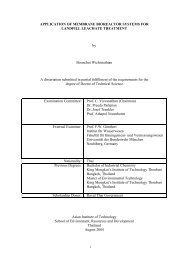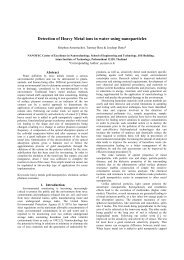Evaluation of Plastic Waste Management in Thailand Using Material ...
Evaluation of Plastic Waste Management in Thailand Using Material ...
Evaluation of Plastic Waste Management in Thailand Using Material ...
Create successful ePaper yourself
Turn your PDF publications into a flip-book with our unique Google optimized e-Paper software.
From Figure 4.33, the revenue from plastic bags and foam charges is collected by the<br />
plastic bag and foam fund. This revenue is provided to local adm<strong>in</strong>istration, bio-plastic<br />
company, and recyclers to support the plastic waste management. M<strong>in</strong>imarts and<br />
department stores play the important role on charg<strong>in</strong>g plastic bag fees and reduc<strong>in</strong>g plastic<br />
bags because 70% <strong>of</strong> Thai consumers get plastic bags from m<strong>in</strong>imarts and department<br />
stores (Thai Health Promotion Foundation, 2011).<br />
In Ch<strong>in</strong>a, the government forced the plastic <strong>in</strong>dustry, and consumers to produce, sell, and<br />
use HDPE bags, so 66% <strong>of</strong> plastic bags were reduced <strong>in</strong> 2009 (Ch<strong>in</strong>a Daily, 2009).<br />
However, the amount <strong>of</strong> plastic bags was <strong>in</strong>crease aga<strong>in</strong> <strong>in</strong> 2011 due to lack <strong>of</strong> monitor<strong>in</strong>g,<br />
awareness <strong>of</strong> consumers, and strict regulation (J<strong>in</strong>ran, 2011). While, the big department<br />
stores <strong>in</strong> England; Marks and Spencer volunteered to charge the plastic bag fees from<br />
consumers (BBC News, 2008). Therefore, the project’s monitor<strong>in</strong>g and voluntaries <strong>of</strong><br />
stakeholders lead to success on the plastic bag taxation <strong>in</strong> <strong>Thailand</strong>.<br />
Moreover, <strong>in</strong> <strong>Thailand</strong>, the “No Bag No Baht” campaign was promoted by BMA <strong>of</strong>fice <strong>in</strong><br />
2012. This project stimulates department stores <strong>in</strong> BMA to reduce the plastic bag used.<br />
Department stores can propose their projects to BMA <strong>of</strong>fice. For example, Central Retail<br />
Ltd., Co. charged one baht from customers who want to use plastic bags, and all charges<br />
are given for the environmental foundation (VOLUNTEERCONNEX, 2013). Some 5,000<br />
to 8,000 shops <strong>in</strong> Chatuchak will<strong>in</strong>gly participated <strong>in</strong> the project. Bangkok Governor gave<br />
away 5,000 cloth bags and flyers to customers <strong>in</strong> order to promote the scheme at the<br />
market (PATTAYA TODAY, 2013). This project confirms that the department store and<br />
small shop are the important stakeholders who help the government to promote and<br />
achieve the goals <strong>of</strong> plastic waste reduction.<br />
There are two types <strong>of</strong> waste shops such as <strong>in</strong>formal and formal waste shops. The formal<br />
waste shops register with the government followed by the antique trade law. The <strong>in</strong>formal<br />
waste shops do not register with the government, and they do not pay any tax or fee for<br />
their bus<strong>in</strong>ess. Form the field observation, the <strong>in</strong>formal waste shop collects and cleans<br />
plastic bags from municipal b<strong>in</strong>s, and then it sells those plastic bags to the recycl<strong>in</strong>g<br />
factory. This activity <strong>of</strong> <strong>in</strong>formal waste shops will support the plastic bag taxation if the<br />
government decides to use that taxation. Like the formal waste shop, it plays the roles on<br />
collect<strong>in</strong>g the recyclable plastic wastes and support<strong>in</strong>g the government to <strong>in</strong>crease<br />
recycl<strong>in</strong>g rate by 30% with<strong>in</strong> 2016.<br />
Consumers, department stores, m<strong>in</strong>imarts, and plastic producers can sell their plastic<br />
wastes and bags to waste shops, and then waste shops supplies their wastes to recyclers.<br />
The recycl<strong>in</strong>g sector is the highlight <strong>of</strong> this scenario because it helps to <strong>in</strong>crease the<br />
recycl<strong>in</strong>g rate <strong>of</strong> plastic wastes. The <strong>in</strong>centives for <strong>in</strong>creas<strong>in</strong>g the recycl<strong>in</strong>g bus<strong>in</strong>ess are<br />
provided to recyclers such as revenues from a plastic bag and foam fund. The<br />
environmental organizations force consumers to reduce, reuse and sort plastic wastes at<br />
sources followed by the 3Rs law, and they also control the environmental pollution from<br />
recycl<strong>in</strong>g factories. Moreover, they force producers to follow that law as well as<br />
consumers.<br />
Lastly, the public-private sector <strong>in</strong>stitutions <strong>of</strong> this scenario consist <strong>of</strong> TPFRIA, TIPMSE,<br />
TBIA, PIT, and TPIA. The organizations relate to promot<strong>in</strong>g the bio-plastic used are TBIA,<br />
PIT, and TPIA because the bio-plastic companies/<strong>in</strong>dustries set the cooperation<br />
82



